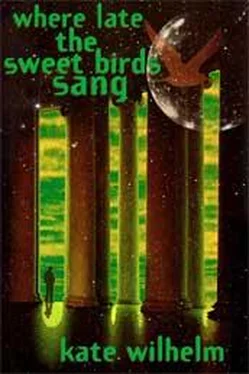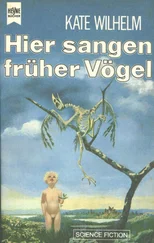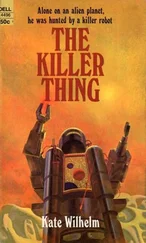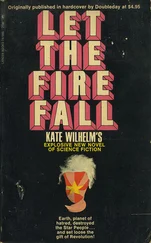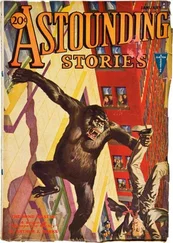She stopped and raised her head. The rain ran over her cheeks and plastered her hair to her forehead. She dropped the shoulder bag that had weighed her down and ran toward him, and only when he caught her and held her tight and hard did he realize that he was weeping, as she was.
Under the lean-to he pulled off her wet clothes and rubbed her dry, then wrapped her in one of his shirts. Her lips were blue, her skin seemed almost translucent; it was unearthly white.
“I knew you’d be here,” she said. Her eyes were very large, deep blue, bluer than he remembered, or bluer in contrast to her pale skin. Before, she had been always sunburned.
“I knew you’d come here,” he said. “When did you eat?”
She shook her head. “I didn’t believe it was this bad here. I thought it was propaganda. Everyone thinks it’s propaganda.”
He nodded and lighted the Sterno. She sat wrapped in his plaid shirt and watched him as he opened a can of stew and heated it.
“Who are those people down there?”
“Squatters. Grandmother and Grandfather Wiston died last year. That gang showed up. They gave Aunt Hilda and Uncle Eddie a choice, join them or get out. They didn’t give Wanda any chance at all. They kept her.”
She stared down into the valley and nodded slowly. “I didn’t know it was this bad. I didn’t believe it.” Without looking back at him, she asked then, “And Mother, Father?”
“They’re dead, Celia. Flu, both of them. Last winter.”
“I didn’t get any letters,” she said. “Almost two years. They made us leave Brazil, you know. But there wasn’t any transportation home. We went to Colombia. They promised to let us go home in three months. And then they came one night, late, almost at dawn, and said we had to get out. There were riots, you know.”
He nodded, although she was still staring down at the farm and couldn’t see. He wanted to tell her to weep for her parents, to cry out, so that he could take her in his arms and try to comfort her. But she continued to sit motionlessly and speak in a dead voice.
“They were coming for us, for the Americans. They blame us, for letting them starve. They really believe that everything is still all right here. I did too. No one believed any of the reports. And the mobs were coming for us. We left on a small boat, a skiff. Nineteen of us. They shot at us when we got too near Cuba.”
David touched her arm and she jerked and trembled. “Celia, turn around and eat now. Don’t talk any longer. Later. You can tell us about it later.”
She looked at him and slowly shook her head. “Never again. I’ll never mention any of it again, David. I just wanted you to know there was nothing I could do. I wanted to come home and there wasn’t any way.”
She didn’t look quite so blue-cold now, and he watched with relief as she started to eat. She was hungry. He made coffee, the last of his coffee ration.
“You want me to fill you in on anything here?”
She shook her head. “Not yet. I saw Miami, and the people, all trying to get somewhere else, standing in line for days, standing on the trains. They’re evacuating Miami. People are falling dead, and they’re just leaving them where they fall.” She shivered violently. “Don’t tell me anything else yet.”
The storm was over, and the night air was cool. They huddled under a blanket and sat without talking, drinking hot black coffee. When the cup began to tilt in Celia’s hand, David took it from her and gently lowered her to the bed he had prepared. “I love you, Celia,” he said softly. “I’ve always loved you.”
“I love you, too, David. Always.” Her eyes were closed and her lashes were very black on her white cheeks. David leaned over and kissed her forehead, pulled the blanket higher about her, and watched her sleep for a long time before he lay down beside her and also slept.
During the night she roused once, moaning, twisting about, and he held her until she quieted. She didn’t wake up completely, and what words she said were not intelligible.
The next morning they left the oak tree and started for the Sumner farm. She rode Mike until they got to the cart; by then she was trembling with exhaustion and her lips were blue again, although the day was already hot. There wasn’t room for her to lie down in the cart, so he padded the back of the wooden seat with his bedroll and blanket, where she could at least put her head back and rest, when the road wasn’t too bumpy and the cart didn’t jounce too hard. She smiled faintly when he covered her legs with another shirt, the one he had been wearing.
“It isn’t cold, you know,” she said matter-of-factly. “That goddamn bug does something to the heart, I think. No one would tell us anything about it. My symptoms all involve the circulatory system.”
“How bad was it? When did you get it?”
“Eighteen months ago, I think. Just before they made us leave Brazil. It swept Rio. That’s where they took us when we got sick. Not many survived it. Hardly any of the later cases. It became more virulent as time went on.”
He nodded. “Same here. Something like sixty percent fatal, increasing up to eighty percent by now, I guess.”
There was a long silence then, and he thought that perhaps she had drifted off to sleep. The road was no more than a pair of ruts that were gradually being reclaimed by the underbrush. Already grass covered it almost totally, except where the rains had washed the dirt away and left only rocks. Mike walked deliberately and David didn’t hurry him.
“David, how many are up at the northern end of the valley?”
“About one hundred ten now,” he said. He thought, two out of three dead, but he didn’t say it.
“And the hospital? Was it built?”
“It’s there. Walt is running it.”
“David, while you’re driving, now that you can’t watch me for reactions or anything, just tell me about it here. What’s been happening, who’s alive, who’s dead. Everything.”
When they stopped for lunch, hours later, she said, “David, will you make love to me now, before the rains start again?”
They lay under a stand of yellow poplars, and the leaves rustled incessantly though no wind could be felt. Under the susurrous trees, their own voices became whispers. She was so thin and so pale, and inside she was so warm and alive; her body rose to meet his and her breasts seemed to lift, to seek his touch, his lips. Her fingers were in his hair, on his back, digging into his flanks, strong now, then relaxed and trembling, then clenched into fists that opened spasmodically; and he felt her nails distantly, aware that his back was being clawed, but distantly, distantly. And finally there were only the susurrant leaves and now and then a long, heaving sigh.
“I’ve loved you for more than twenty years, did you realize that?” he said after a long time.
She laughed. “Remember when I broke your arm?”
Later, in the cart again, her voice came from behind him, softly, sadly. “We’re finished, aren’t we, David? You, I, all of us?”
He thought, Walt be damned, promises be damned, secrecy be damned. And he told her about the clones developing under the mountain, in the laboratory deep in the cave.
Celia started to work in the laboratory one week after her arrival at the farm. “It’s the only way I’ll ever get to see you at all,” she said gently when David protested. “I promised Walt that I would work only four hours a day to start. Okay?”
David took her through the lab the following morning. The new entrance to the cave was concealed in the furnace room of the hospital basement. The door was steel, set in the limestone rock that underlay the area. As soon as they stepped through the doorway, the air was cold and David put a coat about Celia’s shoulders. “We keep them here at all times,” he said, taking a second coat from a wall hanger. “Twice government inspectors have come here, and it might look suspicious if we put them on to go down the cellar. They won’t be back.”
Читать дальше
